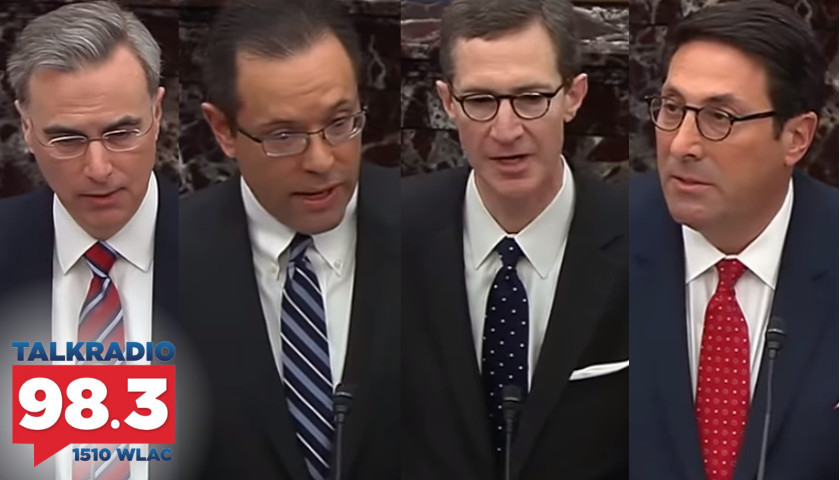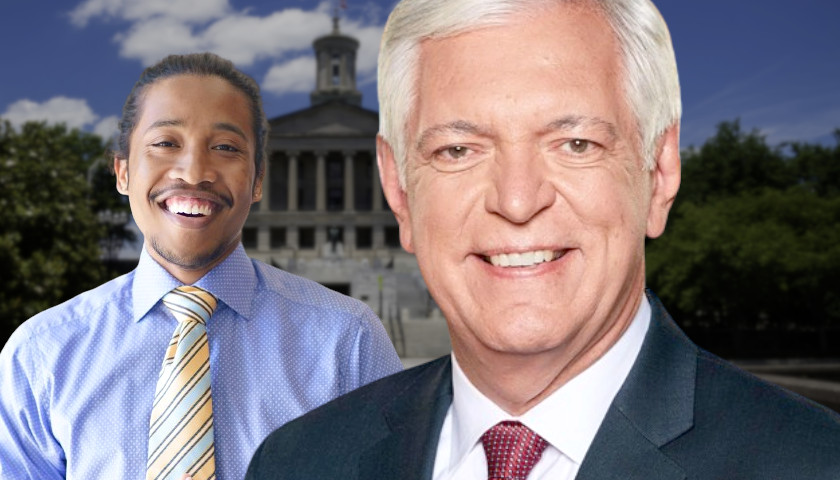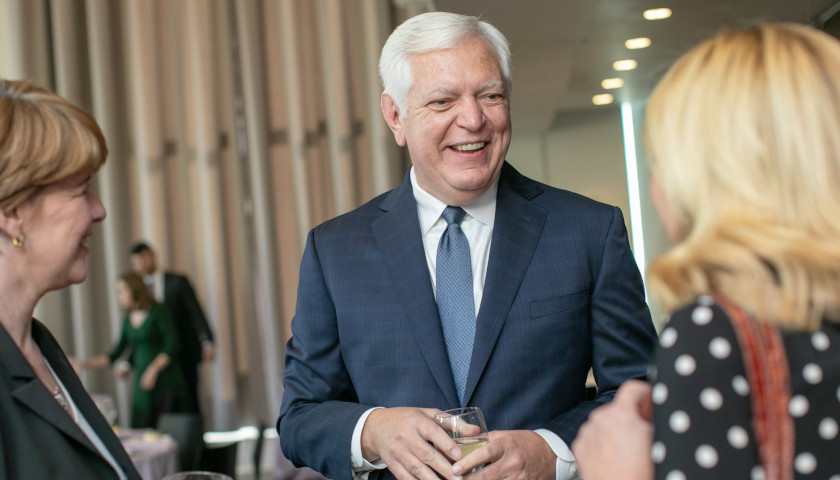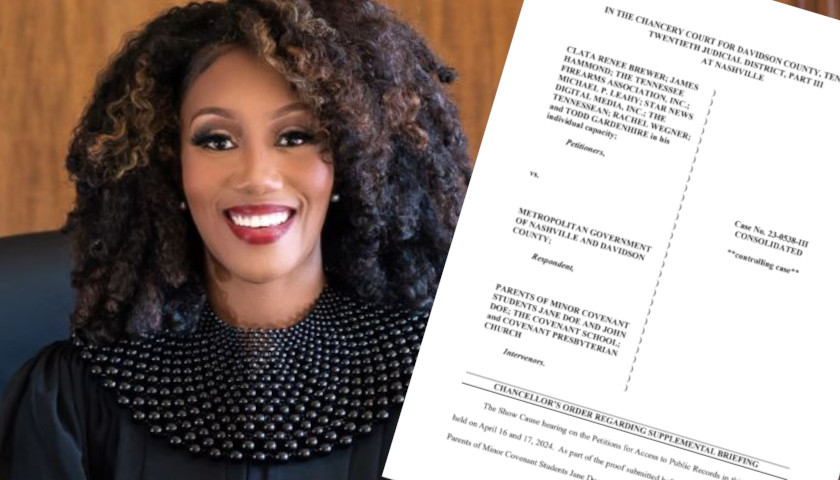Live from Music Row Monday morning on The Tennessee Star Report with Michael Patrick Leahy – broadcast on Nashville’s Talk Radio 98.3 and 1510 WLAC weekdays from 5:00 a.m. to 8:00 a.m. – Leahy was joined in studio by all-star panelist Crom Carmichael.
During the second hour, Carmichael explained what he witnessed on Saturdays’ statements made by Trump’s legal counsel in the Senate trial. He explained how it made clear the reasoning for not complying with Nadler’s subpoenas and differentiated the matter of fact strategy compared to that of a more personal and emotional testimony by the Democrats.
Leahy: Joining me in the studio. The original all-star panelist and good friend Crom Carmichael. Good morning Crom.
Carmichael: Michael. How are you, sir?
Leahy: Well, you did the job that I just didn’t want to do this weekend. You sat down and watched all three hours of the President’s attorneys presenting the beginning of their case.
Carmichael: I did. And I think they said it would be up to three and I think it turned out to be two. They were very matter of fact.
Leahy: And who made the case?
Carmichael: Oh, now you’re asking me trivia.
Leahy: Jay Sekulow and Pat Cipollone?
Carmichael: Cipollone went first. I think Jay Sekulow went second. Then there are two others whose names escape me.
Leahy: Now I’ve not seen how Cipollone presents verbally. But his writing has been spectacular. How did this go?
Carmichael: Well they were right on the point. And I would say that what they did on Saturday it was an overview with a lot of facts. And I think that today and perhaps tomorrow although I don’t know how long they’ll go.
Leahy: They have 24 hours total allotted to them on the Senate floor.
Carmichael: Yes, but I don’t think for example that they have 22 hours left. I think it’s eight and eight.
Leahy: Eight per day.
Carmichael: In other words, I think it’s eight per day over three days. That’s kind of what my thinking is. I will be surprised, well I take that back. If they start at one o’clock eastern time. That’s noon our time. So I guess the prime time when more people will be watching than during the afternoon.
But what they really did was they went all through the legal part. One part that was really interesting is why did they not reply to the subpoenas. Why did the administration? Nadler’s committee subpoenaed witnesses. Why did they not respond? And the answer is they did respond but they responded differently than the way the media has been portraying it.
Leahy: Well tell me that. I’m learning something here.
Carmichael: The reason they didn’t respond by invoking executive privilege. With that response is that the White House’s position is that Nadler subpoenas were illegal. And this is what they said. They said the constitution is very clear, and this is what’s so interesting is the Democrats. I can’t tell whether or not for the Democrats it’s the constitution is the bible.
Or whether authorizing of our national government. Because they go back and forth about praying and somber and all this stuff. But then they don’t follow the rules. And then they say the rule of law. Nobody’s above the law. And they don’t follow the law. And the president, Peter Rodino during the Nixon hearings…
Leahy: Chairman of the judiciary committee at the beginning of the impeachment hearings in the House in 83.
Carmichael: When he wanted to issue subpoenas. He felt that the House first needed to vote because the House has the sole right to impeach.
Leahy: Ahhhh.
Carmichael: He believed that the House needed to vote.
Leahy: As a whole?
Carmichael: As a whole.
Leahy: So that the entire legislative branch was acting. As opposed to just a committee.
Carmichael: So the House did vote to issue subpoenas in 73.
Carmichael: In ’70-whatever-year-it-was.
Leahy: 1973.
Carmichael: And so in this case, when Pelosi had a press conference to authorize the impeachment inquiry. Well, that’s not the House. If the constitution wanted the speaker of the house to have the authority it would have said that.
Leahy: It didn’t say that.
Carmichael: That isn’t what it says. It says the House. So that’s the entire legislative body. So that’s the precedent. And Nadler didn’t follow the precedent and so they sent a letter explaining we are not responding at all because you’re…they sent a letter. I’m assuming that Pat Cipollone is the one that wrote the letter.
Leahy: And boy he is a great writer.
Carmichael: Yeah. But at any rate. So Nadler wrote something back. And they responded to that. And Nadler didn’t even respond to that.
Leahy: So the thing to do to make the case would have been. And if you really cared about the legalities of it. I understand the argument. It’s a very good argument. I think it’s a solid argument. In order to start this whole dispute over executive privilege, the committee cannot act alone.
Carmichael: Right.
Leahy: The entire House of Representatives has to vote on it. Now he could have gotten that vote. He would have gotten it.
Carmichael: Yes.
Leahy: Why did he choose not too?
Carmichael: I don’t have a clue. You’ll have to ask Nadler that question. I don’t know. Well, they knew. Because a letter had been written to him. So it’s not like he acted out of ignorance. When he issued the subpoenas Cipollone sent a letter to him saying your subpoenas are not valid because blah blah blah. And Nadler did nothing.
Leahy: Ahhh.
Carmichael: So what I’m saying is that was part of it. And then they got into some other issues. And by the way, if that’s true. Those are factually true. That takes the second article and wipes it out completely.
Leahy: Obstruction of Congress.
Carmichael: Wipes it out completely. First, of all, he wasn’t obstructing Congress. That was a poorly worded article.
Leahy: Right.
Carmichael: Because the Senate is part the Congress.
Leahy: Right. It would have been obstruction at the House of Representatives.
Carmichael: Yes. But they didn’t want to write that because you can’t obstruct the House unless the House votes. And the House didn’t vote. You see? It would be stupid to write that it was obstruction of the judiciary committee.
Leahy: Let me just follow that up. It seems to me they’re laying the groundwork for dismissal of that one outright.
Carmichael: No. I don’t think that’s going to happen.
Leahy: No, you don’t’ think so?
Carmichael: No. I think it’s better for Trump to be exonerated. I think that the thinking is that it’s better to have a vote.
Leahy: Up or down.
Carmichael: Up or down on conviction or removal. Whatever it is.
Leahy: So you think that’s where they’re headed?
Carmichael: I think that’s where they’ll go. But that’s mine and a dime will buy a buck fifty will buy you a cup of coffee.
Leahy: But you watched all two hours.
Carmichael: Two hours. Which I did not do.
Leahy: My guess is very few people watched that two hours.
Carmichael: I found it to be more interesting than watching the Democrats. The only part that was interesting about that was their creativity.
Leahy: And their emotion.
Carmichael: And just making stuff up that’s not, in other words, they spent a lot of time on Russian collusion. And the Mueller report, and that’s the other part. That’s for Jay Sekulow spent most of his time was on the Russian collusion. He quoted from the Mueller report.
And he said if this is the basis then it doesn’t hold up because the Mueller report proves that that article is bogus. And that’s where they get into the abuse of power which they tried to make so broad that they could throw anything they wanted to into the basket.
But each one of them said we’re laying the foundation for what will come next week. And so that will start today. There was very little emotion on Saturday other than the clarity. I was impressed by the response. I would like to say that I think I would have preferred if they had personalized it more.
Because this is for Schiff and Nadler this is much more personal than it is legal. And I think there are some strategies that could have been used in that regard. But they didn’t use it. Of course, they may use them today or tomorrow. But they didn’t on Saturday.
Leahy: But you’re always impressed by logic. Because you build the Oedipus of logic brick by brick here every day when your on as our listeners know. (Laughs)
Carmichael: I do my best.
Listen to the second hour:
– – –
Tune in weekdays from 5:00 – 8:00 am to the Tennessee Star Report with Michael Patrick Leahy on Talk Radio 98.3 FM WLAC 1510. Listen online at iHeart Radio.
Image “President Trumps Defensers” by C-Span.








